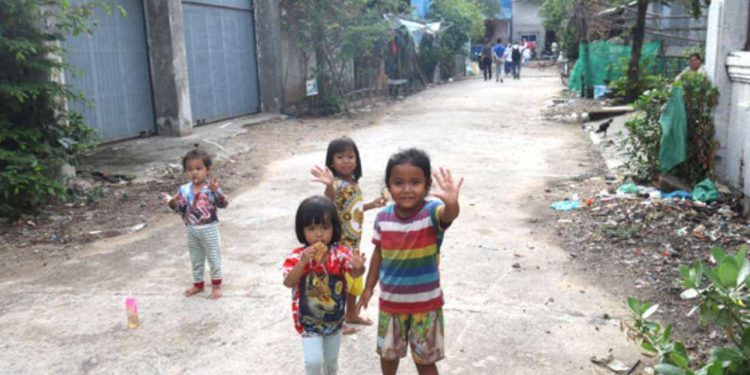Group of Korean Catholics pays visit to the Cambodian Church on a ‘heart-warming’ journey
Cambodian children greet a group of Korean Catholics who visited the country on Jan. 9-13. (Photo: Catholic Times)
For Peter Jung Young-hwa, a Catholic from the Immaculate Conception Church in the South Korean capital Seoul, a five-day visit to Cambodia became a reservoir of unforgettable memories.
“It was a trip away from everyday life to a new place. Seeing and feeling a country with a different landscape and culture different from ours, we gain new energy for life,” said Jung, the Catholic Times reported on Jan. 22.
Jung, who is in his fifties, was among 19 Catholics from the parish who visited Cambodia on Jan. 9-13 to witness the field mission of the Korean Foreign Missions Society. They were led by parish priest, Father Lee Dong-ik.


Father Lee said the visit was planned years ago, but it was stalled due to the Covid-19 pandemic.
The priest visited the Cambodian mission five years ago, which he says was an overwhelming experience.
He said he planned the trip as he wanted to show Korean Catholics a ‘true shepherd who smells like sheep’ he met in Cambodia.
“Poverty has a devastating impact on children”
The group visited the Komiso Vocational School and Clinic run by the society. They also paid a visit to the Some Long Tom Church, Pojentong Church, and St. Joseph’s Church in Sen Suk.
On Jan. 10, the first journey started in Phnom Penh, Cambodia. Unlike other travelers who wear flashy and thin clothes, the Korean Catholics brought sneakers, thin cardigans, mosquito repellent, rosary beads in their bags.
“It was a preparation for going to a slum area where the poor people live, not a scenic tourist destination,” Jung recalled.
Jung says it was a “heart-warming” journey for the group.
Cambodia’s annual per capita GDP is about US$1,591, one-twentieth of South Korea’s as the country is considered one of the poorest countries in Southeast Asia, he noted, adding that poverty has a devastating impact on children.
“People in Cambodia and distant countries only see fragmentary images of them lacking food, sleep, and clothing through the media. But poverty was taking away more than that, I could see when I stood close by. It is hope,” he said.
“We laughed at the innocent eyes of Cambodian children and shed tears at the reality that there is no hope for such children.”
Jung says he could not stop recalling his experience from the visit.
“Vietnamese Catholics in Cambodia are often discriminated against”
“I could not stop reminiscing about that time, but pledged to find a way for them, God’s children, to live with hope and put it into practice. Five days in Cambodia made tomorrow different from today,” he said.
During the trip, the group learned that Vietnamese Catholics in Cambodia are often discriminated against within the country. Many of them had fled from Vietnam and migrated to Cambodia during World War II.
In Buddhist-majority Cambodia, Catholics account for less than one percent (23,000) of the country’s 16.6 million population. About 70 percent of Catholics are believed to be ethnic Vietnamese.
The Korean Foreign Mission Society has been serving Cambodia since 2001. Its main focus is the upliftment of children through education thus enabling them to escape poverty and embrace a bright future, according to its president Father Jeong Doo-young.
The society functions partly as an NGO and operates several technical schools and clinics in the country.
Park Mi-jung, another member of the group, said she was overwhelmed by the reception from the children when they visited Some Long Tom Cathedral.
“I couldn’t understand the words of the song, but the sound was so beautiful that it moved my heart,” she remarked at the children’s choir that performed during the Mass.
The socio-economic circumstances in Cambodia force many children to drop out of school before they graduate. Many Vietnamese children in Cambodia are unable to receive formal education as their births cannot be registered in the country.
“Ethnic Vietnamese have been prevented from registering births, thereby perpetuating statelessness”
Most ethnic Vietnamese do not have the documentation with which to prove their claims of citizenship.
This occurred due to their expulsion in the 1970s, during the Cambodian civil war when they were forced to leave their belongings behind, and the systematic destruction of all civil registration records by the genocidal Khmer Rouge.
Cambodian law allows children of foreigners or immigrants living legally in the country to be issued a birth certificate.
But local officials have conflated issuing birth certificates with conferring nationality: consequently ethnic Vietnamese have been prevented from registering births, thereby perpetuating statelessness for the next generation.
St. Joseph’s Church in Sen Suk was another location where the group witnessed the persistent faith exhibited by the people amidst inadequacies.
Before the trip, Father Lee Beom-seok told his parishioners that St. Joseph’s Church “is where the poorest and poorest of the pastoral areas live.”
The group witnessed the active participation of around 30-40 Catholics who attended Mass in a simple church constructed with wood and tin sheets.
“This community is precious because we know the hearts of the residents who tried to keep their faith despite difficulties,” said Korean missionary Father Won Jong-hyeok.
Some of the group members could connect with the situation that the people in the region were facing.
Some of them compared the living conditions to that of South Korea in the 1970s, while agreeing with Father Lee’s views on the need to inform others of the growing Church in Cambodia and contribute to its growth.
“I think I know the pastor’s [wish] to broaden my thoughts on faith in Cambodia and tell it to [other] people after returning,” said Jeon Byung-seong.
Latest News
Credit: Source link


